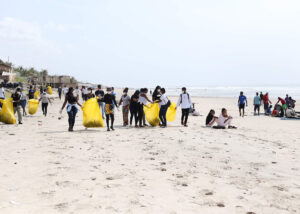November 25, Accra – A unique partnership between the private sector, local government and the University of Ghana Plastic Recycling Project set the stage for a cleanup of plastic waste at Labadi Beach.
Staff from Voltic (GH) Limited, members of the University of Ghana Plastic Recycling Project and the La Dadekotopon Municipal Assembly team joined forces to collect PET bottles for disposal by Beach Cleanup Ghana – a cleantech organisation that uses smart technology to help restore cleanliness to beaches in Ghana.
The cleanup was the second this year involving the same partners in a bid to remove plastic waste affecting the beach and lagoon.
“The interconnected global challenges of packaging waste and climate change have made this a focus for our business and communities. The Coca-Cola Company and its bottling partners are taking a hard look at the packaging we use and how we can drive change,” said Worlasi Seddoh Bedu Mensah, Public Affairs, Communication and Sustainability Manager at Voltic (GH) Limited, a subsidiary of Coca-Cola Beverages Africa.
“Our sustainable packaging strategy aims to create systemic change through a circular economy for our packaging – from how bottles are designed and manufactured, to how they’re recycled and reused.
“We have a responsibility to help solve the global plastic waste crisis, and we’re leveraging our scale and reach across markets to achieve our sustainability goals and reduce waste pollution.
“We can’t do it alone. We work with stakeholders, nonprofits, communities, governments and our industry toward a clean environment,” said Mensah.
“We are working in our communities to educate people on why and how to recycle through collection campaigns, on-package messaging and more to create a more sustainable environment for all.
“Tackling the global plastic waste crisis requires cross-sector collaboration and alignment on common principles and targets.
“We work with a range of stakeholders at a regional and local level. This includes partnering with governments and community organisations to strengthen recycling infrastructure and boost collection rates, collaborating with customers, peers and industry associations to shape public policy that supports a circular economy; and teaming up with suppliers, startups and R&D partners to fuel sustainable packaging innovation,” Mensah said.












